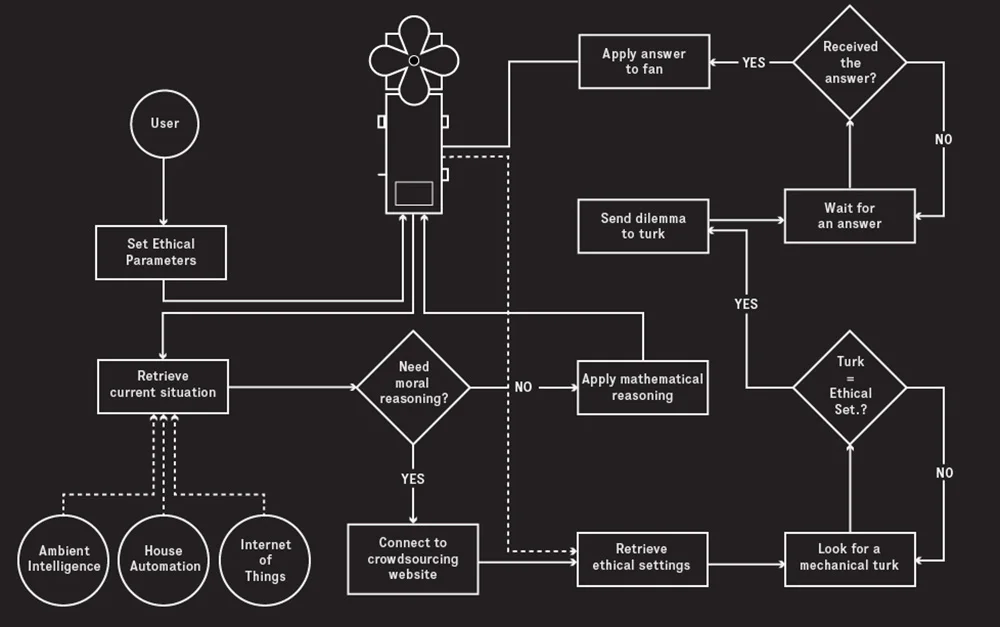Various sensors worn on different body parts. Multiple tracking systems, different data produced.
networkedobject
Fortress of Solitude: exploring the near-future of "smart home"
"Fortress of Solitude" by Space Caviar (Simone Niquille), sound by M.E.S.H:
"is an essay film in three chapters investigating the technology used to make the home smarter. The internet and alternative network protocols are the backbone to home automation. Much of the technology infused into homes and our everyday lives have a history of defense funding or only exist because of military research. Is the smart home in fact a militarisation of the domestic, home.mil? Is our home becoming a data machine rather than architecture for living? Are our most privates spaces broadcasting our lives involuntarily instead of providing shelter?"
Why do I blog this? Both because the topic is important wrt to recent project (cloud computing project, as well as smart cities scouting reports), and because the format itself is intriguing. This is a great exemple of how design work materialize issues, situations and consequences of domestic technologies.
"ethical things": crowdsourcing and networked objects
"Ethical Things" by Matthieu Cherubini and Simone Rebaudengo is a fascinating exploration of autonomous systems and "smart" objects:
"The 'Ethical Things' project looks at how an object, facing everyday ethical dilemmas, can keep a dose of humanity in its final decision while staying flexible enough to accommodate various ethical beliefs.In order to achieve that, our "ethical fan" connects to a crowd-sourcing website every time it faces an ethical dilemma. It posts the dilemma it's facing and awaits the help of one of the "workers", or mechanical turks, who will tell the fan how to behave. Thus, it assures that the decision executed by the system is the fruit of real human moral reasoning. Moreover, the fan is designed to let the user set various traits (such as religion, degree, sex, and age) as criterion to choose the worker who should respond to the dilemma, in order to assure that a part of the user's culture and belief system is in line with the worker, or ethical agent.(Should it be a middle-aged Muslim male with a PhD or a young Atheist female?)"
Why do I blog this? This is a curious investigation mundane and insignificant objects of our everyday lives. It's a good example of a human/non-human collaboration flux based on the articulation of networked objects and crowdsourcing.
The update problem with "smart artifacts"
Having written and talked a lot about technological flops and failures, I'm always fascinated by this time of the year. With the CES at Las Vegas, there's always this resurgence of bad product ideas... and the internet/smart/intelligent/connected fridge is one of them. Ars Technica has a good piece about the problems that one may encounter with smart devices. The list they make is strikingly interesting IMO:
"the "Internet of things" stands a really good chance of turning into the "Internet of unmaintained, insecure, and dangerously hackable things."
These devices will inevitably be abandoned by their manufacturers, and the result will be lots of "smart" functionality—fridges that know what we buy and when, TVs that know what shows we watch—all connected to the Internet 24/7, all completely insecure. [...] Flaws and insecurities will be uncovered, and the software components of these smart devices will need to be updated to address those problems. They'll need these updates for the lifetime of the device, too. [...] In addition to security, there's also a question of utility. Netflix and Hulu may be hot today, but that may not be the case in five years' time. New services will arrive; old ones will die out. Even if the service lineup remains the same, its underlying technology is unlikely to be static."
This necessity to have "updates" is problematic given the tendency tech companies have to badly handle them:
"That costs money, it requires a commitment to providing support, and it does little or nothing to promote sales of the latest and greatest devices. In the software world, there are companies that provide this level of support—the Microsofts and IBMs of the world—but it tends to be restricted to companies that have at least one eye on the enterprise market. In the consumer space, you're doing well if you're getting updates and support five years down the line."
Why do I blog this? The update bit is a problem i didn't consider in my argument against smart fridges but it sounds reasonable and relevant. Concerning CES products, I have to admit I'm far more intrigued by vaping devices and bluetooth-enabled piercings than such smart fridges/watches.


